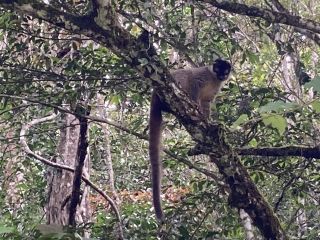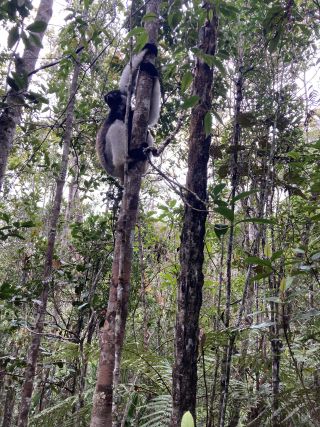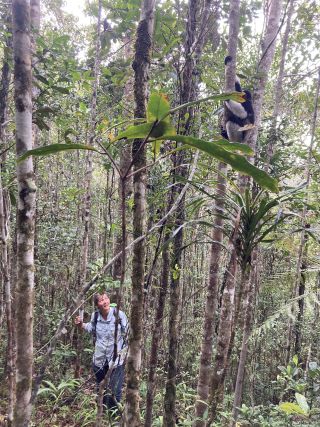Animal Behavior
Lemurs: The Mysterious Primates of Madagascar
All about lemur cognition.
Posted March 5, 2024 Reviewed by Abigail Fagan
Key points
- Lemurs are primates who only live in Madagascar.
- Research on lemurs questions the common notion that a bigger brain makes a smarter animal.
- Smarter mouse lemurs seem to live longer than those who perform worse in cognitive tests.
What do you know about lemurs? I did not know much before I went to Madagascar earlier this year, just that they are somehow related to monkeys, and that some of them have huge round eyes. Now I have learned that there are two groups of primates: haplorhines and strepsirrhines. The first ones are “the ones with the dry nose” — that are the monkeys, the apes and us. Lemurs belong to the second group: strepsirrhines: “the ones with the wet nose”, which means that they have a good sense of smell. Lemurs only live on the big island of Madagascar in South Eastern Africa, and they are famous for being excellent at climbing and jumping. There are around 100 species of them.

We only spotted three species: the tiny mouse lemur — nocturnal and only 27 cm big and thus the smallest primate on the planet; the common brown lemur with a long tale, jumping from tree to tree; and the most impressive one: the beautiful Indri. Before we finally met the latter ones, we had heard them many times. Their plaintive melodic calls can be heard especially in the early hours of the morning. “Songs of the forest” is how local people describe it — and it fits perfectly. The Indris vocalize in this way to mark out their territory.

On a guided tour through the rainforest close to the little town of Andasibe we finally saw them. Three Indris: mother, father and their grown-up offspring, were sitting high up in the trees. At one point, they started to sing their tragic chants — which we had heard so often before. These creatures are black and white with plush fur, and they have very long arms and legs, a small head with a cat face and round plush ears and staring eyes. The three guys we observed were attentively looking around, and it felt as if they could turn their heads 180 degrees. Finally, and very unexpectedly, they came down to us — just 2 meters away — which was also impressive as they are huge — up to 72 cm and thus belong to the largest lemur species. They sucked on trunks and scratched themselves, and looked at us, apparently equally interested in our existence — like we were in theirs.
For example, I asked myself, what do we know about lemur cognition? Primates in general have relatively large brains compared to other mammals. For a long time only the cognitive skills in monkeys and apes were investigated. But in the last few years, lemurs have also gotten some attention.
A huge brain is not everything
One nice tool for testing cognitive skills is the so called Primate Cognition Test Battery. This is a comprehensive set of 16 experiments addressing physical and social cognitive skills, a bit comparable to an IQ test. In a first investigation, about 50 individuals from three lemur species were tested. There were no differences between those three lemur species, and the lemurs performed similarly to monkeys in many aspects. This is surprising as lemurs have smaller brains compared to monkeys. When the researchers looked in more detail, they found that lemurs even outperformed monkeys in the physical domain and showed a similar performance in the social domain. Thus, those mysterious primates of the forest of Madagascar surprised the scientists as they questioned the common notion that a bigger brain makes a smarter animal (Fichtel et al. 2020).
However, the results of a more recent study with lemurs support another hypothesis on cognition: smart animals live longer. For this study, 198 wild gray mouse lemurs were tested in a test battery. Then researchers observed how long each of these individuals lived. As you would expect, smarter individuals lived longer. But to be exact, also heavier and more explorative individuals had an advantage. Thus: being smart is a nice strategy to live longer, but being explorative or being heavy is also a successful strategy (Fichtel et al 2023).
Coming back to my beautiful encounter with the three Indris who approached us in the forest of Andasibe, later I learned why these guys came so close: in that area three of the 11 Indri groups are habituated to humans, because behavioural studies on their vocalization have been carried out here. The species is highly endangered due to habitat destruction, there are only 1000 to 10,000 left. They do not survive in captivity.
Thus, we were very honored that they came so close to us! At some point, they emitted a humming noise, then they climbed back up into the treetops and leaped away from tree to tree in huge jumps.

References
Fichtel, C., Henke-von der Malsburg, J., & Kappeler, P. M. (2023). Cognitive performance is linked to fitness in a wild primate. Sci Adv, 9(28), eadf9365.
Fichtel, C., Dinter, K., & Kappeler, P. M. (2020). The lemur baseline: how lemurs compare to monkeys and apes in the Primate Cognition Test Battery. PeerJ, 8, e10025.


